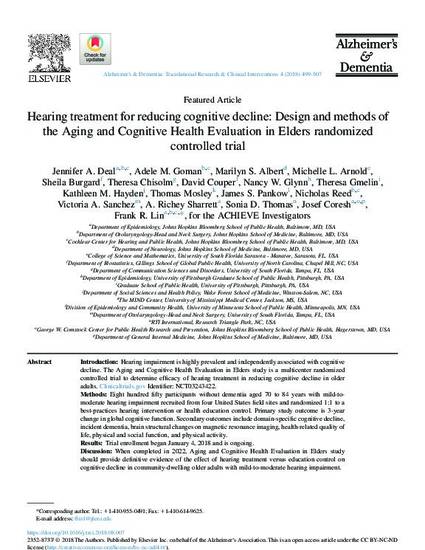
- Clinical trials,
- Cognition,
- Dementia,
- Epidemiology,
- Hearing,
- Longitudinal study,
- Memory,
- Presbycusis
Introduction: Hearing impairment is highly prevalent and independently associated with cognitive decline. The Aging and Cognitive Health Evaluation in Elders study is a multicenter randomized controlled trial to determine efficacy of hearing treatment in reducing cognitive decline in older adults. Clinicaltrials.gov Identifier: NCT03243422.
Methods: Eight hundred fifty participants without dementia aged 70 to 84 years with mild-to-moderate hearing impairment recruited from four United States field sites and randomized 1:1 to a best-practices hearing intervention or health education control. Primary study outcome is 3-year change in global cognitive function. Secondary outcomes include domain-specific cognitive decline, incident dementia, brain structural changes on magnetic resonance imaging, health-related quality of life, physical and social function, and physical activity.
Results: Trial enrollment began January 4, 2018 and is ongoing.
Discussion: When completed in 2022, Aging and Cognitive Health Evaluation in Elders study should provide definitive evidence of the effect of hearing treatment versus education control on cognitive decline in community-dwelling older adults with mild-to-moderate hearing impairment.
Alzheimer's & Dementia: Translational Research & Clinical Interventions, v. 4, issue 1, p. 499-507
Available at: http://works.bepress.com/michelle-arnold/10/
